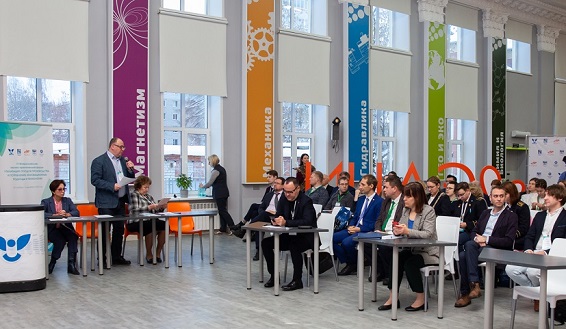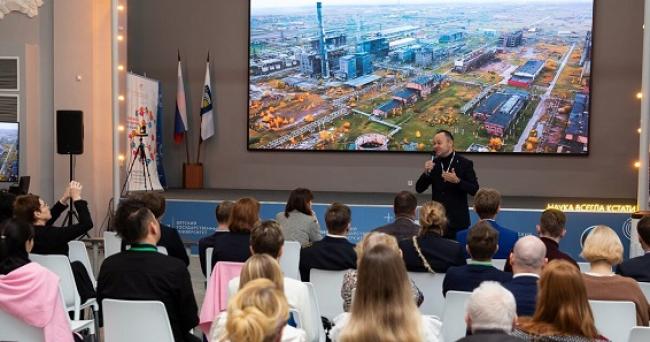How to secure hazardous industrial waste for nature? How to reduce their accumulation and use again for the benefit of society? How to combine both the comfort of civilization and a clean, safe environment?
These and other topical issues of our time about non-waste production and consumption were discussed in Kirov from November 29 to December 2. Representatives of universities and research institutes, professional ecologists, chemists, physicists and biologists, students from 46 cities of the country gathered at the IV All-Russian Scientific and Practical Forum "Production and Consumption Waste Recycling: Innovative Approaches and Technologies" at the Engineeringium of VyatSU.

A task of national importance
The organizers are the Federal Ecological Operator (FEO, an enterprise of the state corporation Rosatom), the scientific and educational consortium Advanced EcoTechnologies, the government and the Public Chamber of the Kirov Region, the regional Ministry of Environmental Protection, the Institutes of Chemistry and Biology of the Komi Science Center of the Ural Branch of the Russian Academy of Sciences, Information Center for Atomic Energy of Kirov, as well as Vyatka State University. The rector of which, Valentin Pugach, opening the meeting, noted the high relevance of the topic and the growing coverage of regions by participation in the forum.
- Everyone knows that for a number of types of industrial waste, processing technologies have yet to be created. And here the role of the scientific community is very important,” Elena Ustinova, head of the project office for the implementation of the federal project “Infrastructure for the management of waste of hazard classes I-II” of the state corporation Rosatom, Elena Ustinova, said in a greeting to the participants of the plenary session of the forum. - First of all, the efforts of science, including the scientific and educational consortium "Advanced EcoTechnologies", will expand the product line of technologies that can increase the depth of processing and reduce its cost.
During the implementation of the federal project "Infrastructure for the treatment of waste of I-II hazard classes", the digital platform of the FSIS OPWC was launched. The federal information system has 54,000 registered users from all regions of the Russian Federation, which is almost half of the market. The institution of the federal operator for the treatment of waste of classes I and II began to work as a single window for all market participants. At the same time, a network of ecotechnoparks is being created for the processing of industrial waste with the return of their useful components to economic circulation.
– Those responsible for the implementation of the national project face a key task: to create a high-tech infrastructure for deep processing of waste, including obtaining recycling products for further use. It is important that science and practice meet at this conference, and this makes it possible to combine efforts and create the necessary infrastructure, - said the moderator of the plenary session, Professor of Vyatka State University Tamara Ashikhmina.
– We have an important request for the support of young scientists, as this system will in the future make a breakthrough in the development of a new industry of waste management and will create a circular economy by returning most of the waste to economic circulation.
Highly hazardous waste is a serious topic
Hazardous waste includes conventional used batteries and accumulators, mercury lamps and other household items, which mostly end up in landfills, causing great harm to the environment. And with proper processing, such waste could be useful.
“The environment will never fully recover from Class I waste. These are practically lost territories, soil, water. Class II waste is 15 years of a lost state, - explained Konstantin Ivanov, head of the technological engineering department of FSUE FEO.
At the plenary session, he made a report on the interim results of the implementation of the project "Infrastructure for waste management of I-II hazard classes." Namely, about the network of ecotechnoparks, created on the principles of safety, environmental friendliness, efficiency and resource saving.
Each ecotechnopark provides for closed systems of circulating water supply and sanitation, each site will be equipped with modern equipment and multi-level security systems, Ivanov explained. The point is to use or recycle as much as possible of class I and II waste.
In the same breath, according to Tamara Ashikhmina, the forum participants listened to the report “Closed carbon cycle in waste disposal, biomass conversion and additive technologies”, presented by Academician of the Russian Academy of Sciences Valentin Ananikov.
Based on the research of the Laboratory of Metal Complex and Nanoscale Catalysts of the Institute of Organic Chemistry named after N.D. Zelinskiy RAS, he spoke about the prospects for carbon-neutral technologies with full recycling, about obtaining biologically active compounds for medicines from organic waste, reusable hot-melt adhesive, bioplastic, and in the future even a benzene ring without environmentally harmful residues.
– Only since 2015 in Russia, the state approach to the system of MSW management has begun to change radically. And today, no one needs to be convinced of the importance of waste recycling, - Alla Albegova, Minister of Environmental Protection of the Kirov Region, noted in her brief speech. “However, since 2019, we have twice chosen a place to create a waste sorting complex and refused it, meeting the opinion of the population. Nobody wants such a neighborhood. Nevertheless, a site for the technopark will be selected, built by 2025, and we plan to unite the efforts of all investors, all companies involved in the treatment of MSW.
Read in Russian at the soyrces Kirovskaya pravda >>>

